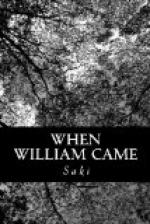“Hark! The kettledrums!” exclaimed the commanding voice of Lady Bailquist. “His Majesty is coming. Quick, bundle into the car.”
The crowd behind the police-kept lines surged expectantly into closer formation; spectators hurried up from side-walks and stood craning their necks above the shoulders of earlier arrivals.
Through the archway at Hyde Park Corner came a resplendent cavalcade, with a swirl of colour and rhythmic movement and a crash of exultant music; life-guards with gleaming helmets, a detachment of Wurtemberg lancers with a flutter of black and yellow pennons, a rich medley of staff uniforms, a prancing array of princely horsemen, the Imperial Standard, and the King of Prussia, Great Britain, and Ireland, Emperor of the West. It was the most imposing display that Londoners had seen since the catastrophe.
Slowly, grandly, with thunder of music and beat of hoofs, the procession passed through the crowd, across the sward towards the saluting base, slowly the eagle standard, charged with the leopards, lion and harp of the conquered kingdoms, rose mast-high on the flag-staff and fluttered in the breeze, slowly and with military precision the troops and suite took up their position round the central figure of the great pageant. Trumpets and kettledrums suddenly ceased their music, and in a moment there rose in their stead an eager buzz of comment from the nearest spectators.
“How well the young Prince looks in his scout uniform.” . . . “The King of Wurtemberg is a much younger man than I thought he was.” . . . “Is that a Prussian or Bavarian uniform, there on the right, the man on a black horse?” . . . “Neither, it’s Austrian, the Austrian military attache” . . . “That is von Stoppel talking to His Majesty; he organised the Boy Scouts in Germany, you know.” . . . “His Majesty is looking very pleased.” “He has reason to look pleased; this is a great event in the history of the two countries. It marks a new epoch.” . . . “Oh, do you see the Abyssinian Envoy? What a picturesque figure he makes. How well he sits his horse.” . . . “That is the Grand Duke of Baden’s nephew, talking to the King of Wurtemberg now.”
On the buzz and chatter of the spectators fell suddenly three sound strokes, distant, measured, sinister; the clang of a clock striking three.
“Three o’clock and not a boy scout within sight or hearing!” exclaimed the loud ringing voice of Joan Mardle; “one can usually hear their drums and trumpets a couple of miles away.”
“There is the traffic to get through,” said Sir Leonard Pitherby in an equally high-pitched voice; “and of course,” he added vaguely, “it takes some time to get the various units together. One must give them a few minutes’ grace.”




